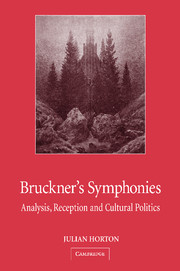Book contents
- Frontmatter
- Dedication
- Contents
- Preface
- 1 Introduction: the critical problem
- 2 Bruckner and late nineteenth-century Vienna: analysis and historical context
- 3 Right-wing cultural politics and the Nazi appropriation of Bruckner
- 4 Bruckner and musical analysis
- 5 Bruckner and the construction of musical influence
- 6 Analysis and the problem of the editions
- 7 Psychobiography and analysis
- 8 Epilogue: Bruckner and his contexts
- Bibliography
- Index
6 - Analysis and the problem of the editions
Published online by Cambridge University Press: 22 September 2009
- Frontmatter
- Dedication
- Contents
- Preface
- 1 Introduction: the critical problem
- 2 Bruckner and late nineteenth-century Vienna: analysis and historical context
- 3 Right-wing cultural politics and the Nazi appropriation of Bruckner
- 4 Bruckner and musical analysis
- 5 Bruckner and the construction of musical influence
- 6 Analysis and the problem of the editions
- 7 Psychobiography and analysis
- 8 Epilogue: Bruckner and his contexts
- Bibliography
- Index
Summary
Cliff Eisen and Christopher Wintle prefaced a recent study of Mozart's C minor Fantasy, K.475, with the following remarks:
Turn-of-century scholarship … faces a dilemma. On the one hand, division of labour has necessarily created an ever-higher degree of specialization in each musicological field; on the other hand, each field, by virtue of this specialization, stands in need of other fields to furnish an appropriate range of approaches and to help resolve its problems responsibly.
The disciplinary convergence Eisen and Wintle have in mind involves the beneficial cooperation of philology and analysis. The sources and editions for K.475 reveal discrepancies, the interpretation of which is, as they put it, ‘crucially dependent … on analysis’.
This dilemma is nowhere more pressing than in the field of Bruckner scholarship. The textual discrepancies highlighted by Eisen and Wintle, although by no means analytically insignificant, are small in comparison with the variations present in the editions of Bruckner's symphonies. Increasingly specialised philological research into these matters has generated an array of problems that philology is quite simply incapable of resolving.
A significant proportion of these problems concern the relationship between textual scholarship and analysis. Whilst it may well be the case that analytical engagement with Bruckner's music has been impeded by the textual situation, the more or less covert reliance of textual scholarship on analysis has been no less evident. In truth, analysis forms a troublesome supplement to much of the literature ostensibly concerned with textual issues.
- Type
- Chapter
- Information
- Bruckner's SymphoniesAnalysis, Reception and Cultural Politics, pp. 196 - 222Publisher: Cambridge University PressPrint publication year: 2004



